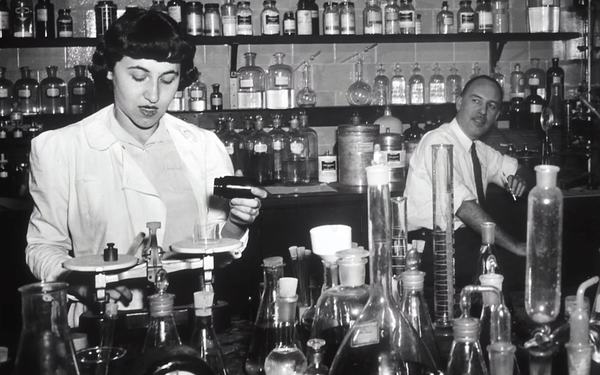Commentary
Single-Dose Ear Meds, Prostate Cancer Treatment: Chemists' Mini-Breakthroughs
- by Les Luchter , Staff Writer, August 17, 2023

Contrary to what many of us remember, DuPont advertising never used the exact words “Better living through chemistry.”
But, based on our virtual attendance at the recent meeting of the American Chemical Society (ACS), we can say that chemists are definitely doing the preliminary research that could lead to better health products down the road.
Truth be told, some 12,000 scientific reports were presented at the six-day event, which concludes today, so we thank the ACS Newsroom for helping us find the following highlights:
How about a single-use gel for treating kids’ ear infections?
Cornell University researchers noted that even after a couple of hundred years of bleach use, bacteria have yet to develop widespread resistance to the household cleaner.
So the researchers used extremely low concentrations of bleach’s main ingredient, hypochloric acid, in the ears of chinchillas to kill off a type of bacterium that also causes human ear infections, and it could “someday be easily applied as a gel.”
The researchers noted that ear infections affect more than 95% of children in the U.S., typically requiring a five to 10 days of antibiotics, and that the tested alternative would require just a single use.
***
Research conducted by City of Hope, a California-based cancer treatment center, and the Morehouse School of Medicine may provide a breakthrough in detection and treatment of metastatic prostate cancer in Black men.
Black men are 60% more likely to get metastatic prostrate cancer than with other men – and twice as likely to die from it, according to the National Cancer Institute.
In a preliminary small clinical trial, the researchers identified four metabolism-related biomarkers that are linked to an increased risk of metastatic prostate cancer in men of West African heritage.
“Ultimately, we hope to build a multi-component test doctors could use to predict which Black men are at the highest risk of developing and dying from prostate cancer,” said the projects’ principal investigator.
***
“Can you recognize someone you haven’t seen in years, but forget what you had for breakfast yesterday?” asked an ACS press release. “Our brains constantly rearrange their circuitry to remember familiar faces or learn new skills, but the molecular basis of this process isn’t well understood.”
Researchers at the California Institute of Technology, though, have now determined that complex sugars -- not to be confused with those simple sugars that always increase our calorie intake too much -- affect brain “plasticity” in mice, including memory functions.
Determining how these sugars “function could help us understand how memory and learning work in humans,” and could lead to “potential treatment for central nervous system injuries, neurodegenerative diseases or psychiatric disorders,” the ACS said.


